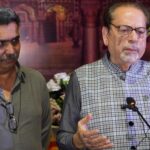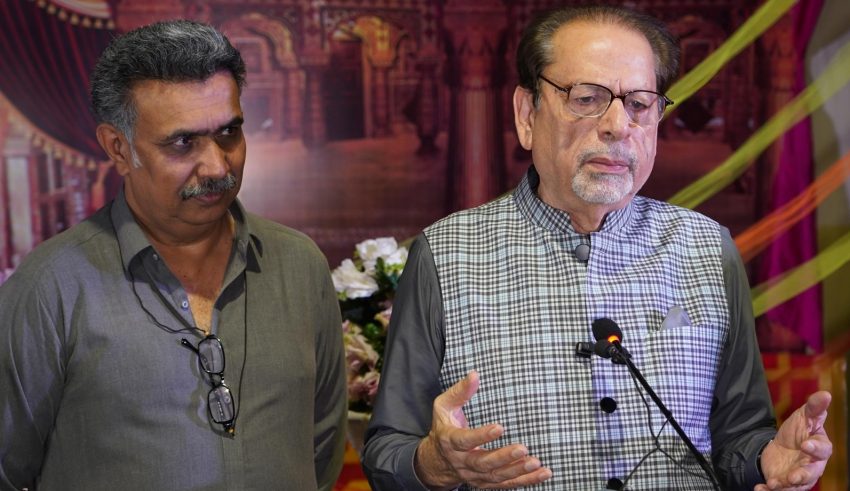President of Arts Council Mohammad Ahmed Shah welcomed the attendees during his welcome note at the opening ceremony of the 10th International Urdu  Conference 2017 with a big smile and warm words. He said that he has envisions our country with the ideology of Iqbal, the love and passion of Bullay Shah and through the canvas of Sadequain. He further said that he likes to admire and value people not based on their age and seniority but their knowledge and wisdom.
Conference 2017 with a big smile and warm words. He said that he has envisions our country with the ideology of Iqbal, the love and passion of Bullay Shah and through the canvas of Sadequain. He further said that he likes to admire and value people not based on their age and seniority but their knowledge and wisdom.
In the 10 years of its existence, the International Urdu Conference organised by the Arts Council of Pakistan Karachi has seldom begun on a murky day. On Thursday, as the 10th edition of the five-day conference started, the weather conditions were slightly overcast and the air was a little chilly. 
But there was nothing cold aboutIndian scholar Prof Shamim Hanafi`s keynote address or subsequently Zia Mohyeddin`s reading of select pieces from Mushtaq Ahmed Yousufi`s works.  The former`s paper and the latter`s performance brimmed with warmth and thoughtfulness.
The former`s paper and the latter`s performance brimmed with warmth and thoughtfulness.
Prof Hanafi said the title of his paper was adapted from the name of Krishna Sobti`s novel Soorajmukhi Andherey Ke. Sobti belonged to writer Abdullah Husain`s city, the Pakistani side of Punjab, and now was in her sunset years [in Delhi].
Prof Hanafi said the dreams that were seen before independence were left behind. The citizens of the world that we had afterwards were recognised by their helplessness and loneliness; `Woh intizar tha jis ka yeh wohsahar to nahin` (this is not the dawn we envisaged). And this phase was followed by a new one.
Prof Hanafi said, in a recently published interview Sobti said that to understand the challenges faced by the act of writing [storiesj it`s important to look at the fact that writing was always more significant than its writer; and even greater than that were the values that humanity tried to uphold.  This suggested that today the issue that literature was faced with was the issue of a certain kind of humanism (insaan dosti).
This suggested that today the issue that literature was faced with was the issue of a certain kind of humanism (insaan dosti).
Prof Hanafi said the tradition of resistance on an intellectual and emotional level was given shape by the Progressive Writers` Movement in 1936.
But after 1947 certain new forms of resistance and protest came into being.
That included the ability to doubt one`s own self. We had spent the last 70 years with a feeling of moral trepidation. This feeling was getting deeper by the day. It meant that the literature produced before 1947 could not be the role model fortheliterature produced after 1947.
Many of the literary terminologies had shrivelled. Today`s conflict was more with space than with time. We should get rid of intellectual jargon (ilmi istilahein). We should express our concerns in simple language.
Contemporary life was the narration of man`s experiences not an experiment in narration.
Prof Hanafi said Picasso`s painting Guernica was a scream (cheekh) against the horrors of war. Guernica was first exhibited 10 years before our independence. This [modern-day] situation urged us to have a new perspective on art andliterature.  An Indian poet Muktibodh, who was born in 1917, had a great influence on Indian literature. He reflected the situation [in India] at the time. The 18th century poet Nazir saw the moon as a roti (bread) but Muktibodh found the face of the moon crooked.
An Indian poet Muktibodh, who was born in 1917, had a great influence on Indian literature. He reflected the situation [in India] at the time. The 18th century poet Nazir saw the moon as a roti (bread) but Muktibodh found the face of the moon crooked.
Prof Hanafi said from Qurratulain Hyder to Intizar Husain in fiction to Nasir Kazmi and Majeed Amjad in poetry, it`s a different period, more bitter and uneven. Prose poetry and the new ghazal had tried to make an effort to comprehend the change. Often the writers who went off the beaten track and didn`t thinl( much about set principles played an important role [in literature]. And humanism was the point where all writers` Ghalib, Qurratulain Hyder, Intizar Husain, Manto, etc thoughts converged. In some societies, tolerance and one another`s acceptance created a particular facet of politics. `Some people doubt it, let them doubt it.
Earlier, the first keynote speech was given by Mubin Mirza. He said it wasbecause of literature that he was able to grasp the intricacies of life. It was literature that saved us from getting into the clutches of death, and encouraged us to live life. He added that literature enabled him to hear his own voice and then let others hear that voice.
The keynote addresses were followed by brief comments on the conference by more than a dozen literary luminaries present on stage. Finally, provincial Culture Minister Syed Sardar Shah spoke. 
He said politics divided people but the Urdu language brought them together. He also recited Shah Latif and Sachal`s poetry.
The penultimate session of the inaugural day was eminent artist Zia Mohyeddin`s reading of distinguished humorist and satirist Mushtaq Ahmed Yousufi`s prose. As always, the audience loved his performance.
The last item on the programme`s list was qawwali by Farid Ayaz and Abu Mohammad. (Thanks Dawn)












